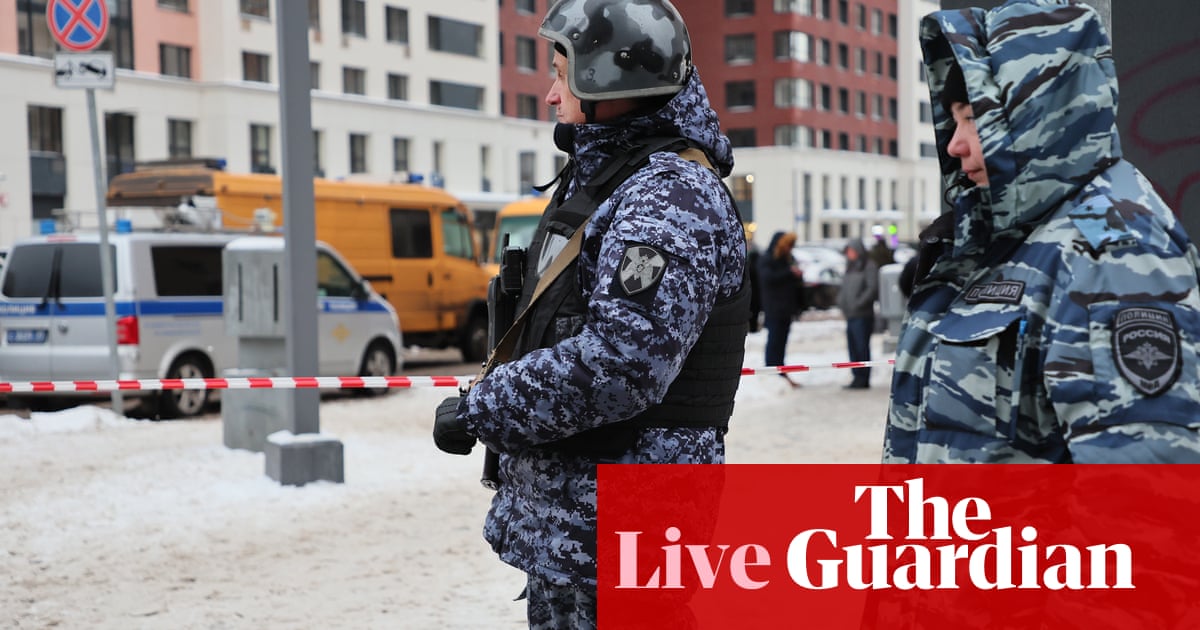Key events
Russia’s foreign ministry said on Wednesday that Ukraine had repeatedly dropped white phosphorus munitions from drones in September.
Russian foreign ministry spokesperson Maria Zakharova said law enforcement agencies had evidence of the use of such munitions by Ukraine, but she did not provide details of the evidence.
There was no immediate comment from Ukraine which has accused Russia of using phosphorus, Reuters reported.
Zakharova also said Russia will respond to a new set of European Union sanctions which Moscow considers a danger global energy security.
The European Union imposed a 15th package of sanctions against Russia on Monday, including tougher measures against Chinese entities and more vessels from Moscow’s so-called shadow fleet on Monday.
Russia to raise Ukraine’s killing of top general in Moscow at UN meeting, Russian foreign ministry says
The Russian foreign ministry said on Wednesday that Russia will raise the asssassination in Moscow of top Russian general Igor Kirillov by Ukraine at the UN security council on 20 December.
Russian foreign ministry spokesperson Maria Zakharova said everyone involved in the killing would be found and punished.
Lt Gen Igor Kirillov, who was the chief of Russia’s Nuclear, Biological and Chemical Protection Troops, was killed in Moscow on Tuesday.
Opening summary
Hello and welcome to the Ukraine live blog. I’m Tom Ambrose and will be bringing you all the latest developments throughout the day.
We start with news that Russia has detained an Uzbek citizen who investigators believe placed the bomb which killed Lt Gen Igor Kirillov on the instructions of Ukraine’s security service, the country’s investigative committee has said.
The 29-year-old had been recruited by Ukrainian special services and promised $100,000 and travel to the European Union, the news agency Tass reported, citing the country’s domestic spy agency, the FSB.
The man was arrested in the village of Chernoye in the Balashikha district of Moscow, the news agency Ria reported, citing interior ministry spokeswoman Irina Volk.
Kirillov, the head of the military’s chemical, biological and radiological weapons unit, was killed in an explosion along with his assistant as the two men left a building in a residential area in south-east Moscow on Tuesday.
A source in Ukraine’s SBU security service said Kyiv was behind the attack. See the link below to follow the story as it develops:
In other news today:
-
Donald Trump’s incoming Ukraine envoy, retired Lt Gen Keith Kellogg, will travel to Kyiv and several other European capitals in early January on a fact-finding trip, according to two sources with knowledge of planning. They said he would visit senior leaders in Kyiv, and his team was working to set up meetings with leaders in other European capitals, such as Rome and Paris, though plans could change.
-
North Korean forces have taken “several hundred” casualties fighting against Ukrainian troops in Russia’s Kursk region, according to a senior US military official. This “would include everything from … light wounds up to being KIA [killed in action]”, the official said, with soldiers of “all ranks” among the casualties. “These are not battle-hardened troops. They haven’t been in combat before … [that is] why they have been suffering the casualties that they have at the hands of the Ukrainians.” Ukraine’s commander-in-chief, Oleksandr Syrsky, said Russia has used North Korean troops at the heart of an “intensive offensive” in Kursk over several days.
-
Lt Gen Igor Kirillov, who was blown up in Moscow on Tuesday by Ukrainian intelligence, headed the Russian military’s radiological, chemical and biological defence programme – a unit blamed by Ukraine, the US and UK for involvement in the use of chemicals on the battlefield, Dan Sabbagh explains. Ukrainian soldiers report a persistent use of chemical weapons, mostly teargas, whose deployment on the battlefield is illegal. The US and UK go further in their accusations and say Russia is using another toxic agent, chloropicrin, first employed to gruesome effect in the trenches of the first world war.
-
Nato has taken over as planned from the US in coordinating western military aid to Ukraine, a source said on Tuesday, in a move widely seen as aiming to safeguard the support mechanism against Donald Trump. Nato’s military headquarters, Shape, confirmed its Ukraine mission was assuming responsibilities from the US and international organisations. “The work of NSATU … is designed to place Ukraine in a position of strength, which puts Nato in a position of strength to keep safe and prosperous its one billion people in both Europe and North America,” said US army Gen Christopher G Cavoli, the supreme allied commander Europe. “This is a good day for Ukraine and a good day for Nato.”
-
The headquarters of Nato’s new Ukraine mission, dubbed Nato Security Assistance and Training for Ukraine (NSATU), is located at Clay Barracks, a US base in the German town of Wiesbaden. It takes over from the US-led Ramstein group. NSATU is set to have a total strength of about 700 personnel, including troops stationed at Shape in Belgium and logistics hubs in Poland and Romania. Diplomats acknowledge that benefits of the handover to Nato could be lessened if the US under Trump slashes support. The president-elect has previously threatened to pull out of Nato and invited Vladimir Putin to attack its members if they do not contribute more funding.
-
Britain on Tuesday sanctioned 20 ships it said had been carrying illicit Russian oil. “As [Russian president Vladimir] Putin’s oil revenues continue to fuel the fires of his illegal war, Ukrainian families are enduring cold, dark nights, often without heating, light or electricity, targeted by Russia’s relentless missile attacks,” said Keir Starmer, the British prime minister.
-
The Ukrainian air force said on Tuesday it had downed 20 Russia-launched drones. It said on the Telegram messenger that Russia had launched a total of 31 drones and an additional 10 did not reach their targets.

